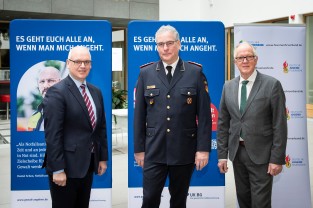Survey among firefighters: Insults and threats are a sad everyday occurrence on duty
First nationwide survey of volunteer firefighters on experiences of violence
28.12.2023

Dr. Stefan Hussy (Director General of DGUV), Karl-Heinz Banse (President of the German Fire Services Association) and Thomas Wittschurky (Head of the Social Affairs Committee of the German Fire Services Association). (Photo: © Simone M.Neumann - www.simone-m-neumann.de)
Experiences of violence in the line of duty are not uncommon for volunteer firefighters. This is the result of a nationwide survey of members of volunteer fire brigades conducted by the German Fire Services Association (DFV) together with the German Social Accident Insurance (DGUV) and presented today. According to the survey, around half of the respondents stated that they had experienced violence on duty in the past two years. Verbal violence in the form of insults or threats dominated. Physical assaults occur much less frequently. Against this backdrop, the DFV and DGUV are appealing to all parts of society to take a firm stance against violence.
"The number of incidents of violence experienced against emergency services personnel is too high - and is now sadly commonplace," says Karl-Heinz Banse, President of the German Fire Services Association. "Firefighters are far too often exposed to psychological stress through insults, verbal abuse and threats during their voluntary work." DGUV Director General Dr Stefan Hussy added: "Disrespect and aggression towards emergency services are not trivial. They demotivate and frustrate those affected. This harms the voluntary sector and ultimately society as a whole."
The DFV and DGUV survey is the first nationwide survey to focus specifically on the experiences of violence by volunteer emergency services personnel. Over 6,500 firefighters took part from the beginning of November to mid-December 2023. The Institute for Work and Health of the DGUV (IAG) in Dresden conducted the online survey and analysed the figures. 3,275 people stated that they had experienced aggression on duty in the past two years - most frequently in the form of insults and verbal abuse. Attempts at intimidation were also common - for example, the threat of being hit by a car. However, physical attacks - for example with fists, fireworks or a weapon - are much rarer.
The DFV and DGUV also enquired about dealing with experiences of violence and the need for support. "It is pleasing to see that reporting behaviour within the fire service is good," says Banse. More than three quarters of those affected by violence stated that they had reported it internally. However, many firefighters still did not report the incident to the police because they did not believe that their concerns would be taken seriously. "It is completely incomprehensible if attacks on firefighters are not prosecuted consistently because the law enforcement authorities see 'too little public interest' in them." Hussy emphasises: "Anyone who stands up for others must be sure of the support of the community. This also means that anyone who uses violence against emergency services must be held accountable. Every attack on them is of public interest." The two umbrella organisations believe that voluntary work is under long-term threat from a brutal tone of voice and a lack of respect both online and offline. Current campaigns such as #GewaltAngehen by the DGUV are intended to sensitise society to this.
Urgent appeal with a view to New Year's Eve
Banse and Hussy issued an urgent warning against a repeat of the violent attacks on New Year's Eve 2022/23, particularly against emergency services: "This violence must stop. People who rush to help others must not have to fear for their own safety and health," emphasises Hussy. "Society must return to respectful standards of behaviour. Zero tolerance for violence is the first step that each and every individual can take immediately," appeals Banse.
Contact
DGUV - Pressestelle
Glinkastraße 40
10117 Berlin
Tel.: +49 30 13001-1414
presse@dguv.de
Stefan Boltz (Pressesprecher)
Elke Biesel (Stv. Pressesprecherin)